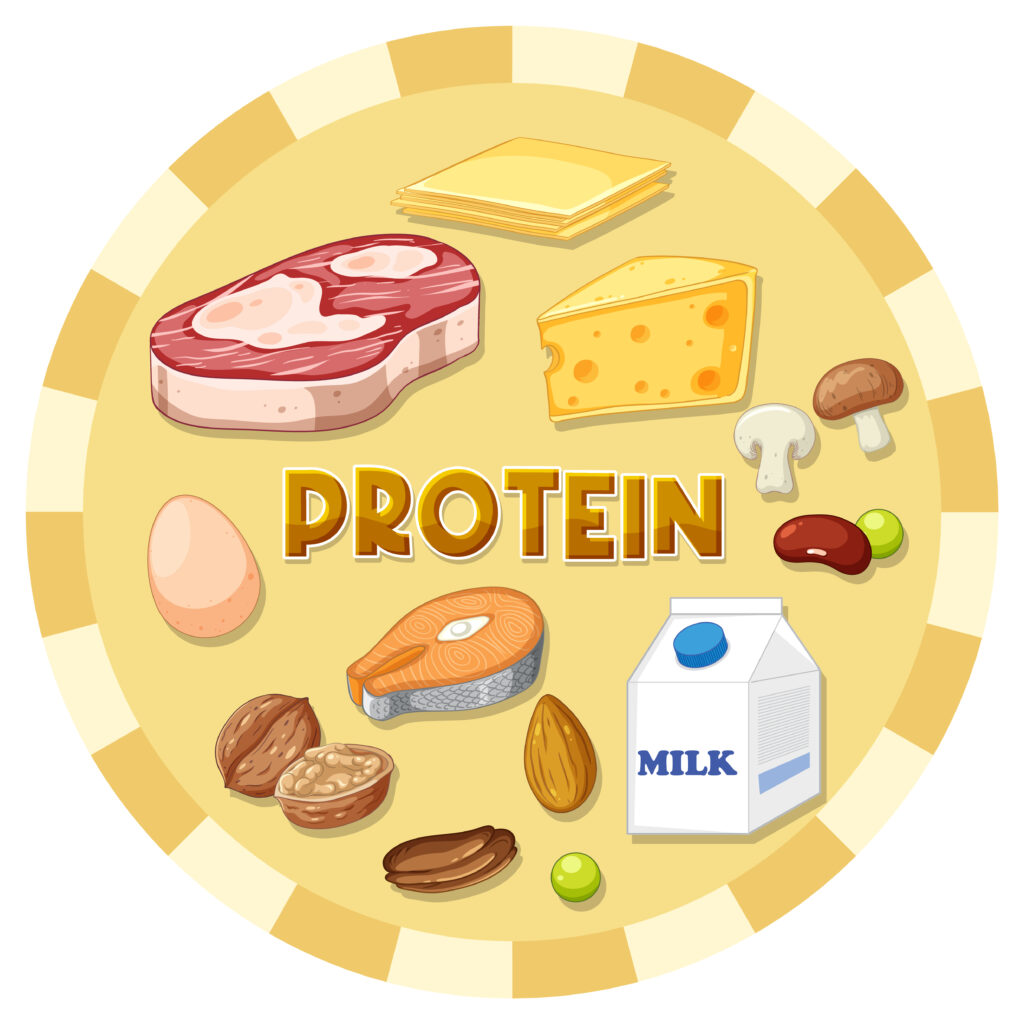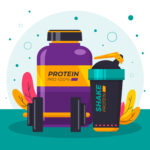Protein is often hailed as the king of nutrients and rightly so. It builds muscle, boosts
metabolism, helps repair tissues, and keeps you feeling full. From athlete enthusiasts to weight-
watchers, everyone seems to be on the high-protein diet trend.
Can you have too much protein? Can consuming high amounts of protein every day cause
health problems? Let’s dive into the benefits of eating protein, how much is too much and what
happens if you overdo it.
Why Protein Is Essential For Your Body?
Protein is a micronutrient made up of amino acids, the building blocks of life. Your body uses
protein to:
● Grow and repair muscles, bones , skin and tissues
● Create enzymes and hormones
● Support immune functions
● Maintain healthy hair , nails and skin
● Aid in cell regeneration
Whether you’re a gym enthusiast, an athlete or just want to stay fit in general, adequate protein
intake is necessary for energy, recovery and overall health.
How Much Protein Do You Really Require?
According to most health organisations, the recommended dietary allowance for protein is:
● Sedentary adults need 0.8grams of protein per kilogram of body weight daily.
● 1.2-2.0 grams per kilogram for athletes, bodybuilders or those on weight-loss journey.
Suppose for example, if you weigh 70 kg (154 lbs) , you need roughly 56 grams of protein daily,
more if you are active. However, many high-protein diets recommend 100-200 grams or more
per day, which can exceed your body’s needs.
Health Benefits of Eating More Protein
Eating slightly higher than recommended protein levels can offer health advantages, especially
for active individuals.
- Boosts Muscle Growth and repairing
Protein Stimulates muscle protein synthesis, a key factor for building lean muscle mass,
especially after workouts. - Appetite Control and Weight Loss
Protein increases satiety hormones and reduces cravings, helping control calorie intake. - Boost Metabolism
A high-protein diet increases the thermic effect of food (TEF), your body burns more calories to
digest protein than carbs or fats. - Keeps Blood Sugar Levels Controlled
Unlike refined carbs, protein causes a gradual rise in blood sugar, making it beneficial for those
with insulin resistance or type 2 diabetes. - Promote Bone Health
Despite common myths, higher protein intake (especially from dairy and plant sources) supports
bone density and reduces fracture risk
Can Too Much Protein Be Harmful?
Yes, eating excessive amounts of protein daily, especially over long periods, can lead to
unwanted health issues. Here’s a closer look at the potential risks:
- Strain in Kidney
One of the most debated concerns is the effect on kidneys. While healthy individuals can
process high protein, people with pre-existing kidney disease or risk factors should be cautious.
A high protein load increases urea and nitrogen waste, which the kidneys must filter. Gradually
this can abrupt kidney function. - Dehydration
Protein metabolism needs more water to remove the nitrogen waste. If your protein intake is
high and water intake is low, it may lead to dehydration, fatigue and headaches. - Digestive Issues
Too much protein and too little fiber ( especially on low-carb diets) can cause:
● Constipation (Hard Stools)
● Gassiness & heaviness
● Gut flora imbalance
- Nutrient Deficiency
Focusing only on protein often leads to reduced intake of fruits, vegetables , and whole grains,
resulting in vitamin, mineral, and fiber deficiencies. - Weight Gain
Ironically, excess protein is stored as body fat if your total calorie intake exceeds your
expenditure. High-protein diets can be calorie-dense, especially with protein shakes and red
meats. - Heart Health Concerns
Consuming too much animal-based protein (like red and processed meats) can increase bad
cholesterol (LDL) and raise the risk of heart disease.
Animal vs Plant-Based Protein Sources
Not all proteins are equal. It’s important to balance your protein sources for optimal health.
Animal-Sourced Proteins
● Boiled eggs
● Meat and mutton
● Fish & Salmon
● Plain Yogurt
● Dairy (milk)
Plant-Sourced Proteins
● Pulses & lentils
● Peas and Chickpeas
● Tofu, Tempeh
● Nut(almonds) & Seeds(Chia)
● Veggies and legumes
Plant-based proteins offer added benefits like fiber, antioxidants, and lower saturated fat. A
combination of both sources can give you all essential amino acids and better heart health.
How to Balance Protein Intake the Right Way?
Here are simple tips to enjoy the benefits of protein without the downsides:
Cover Protein Throughout the Day
- Instead of loading up at dinner, include protein in every meal be it breakfast, lunch , snacks and
dinner. - Combine With Fiber and Healthy Fats
This supports digestion, satiety, and nutrient absorption. Suppose a quinoa salad with veggies
and olive oil, or eggs with avocado toast. - Drink water
Drink plenty of water especially when eating more protein to support your kidneys and flush out
toxins. - Prioritize Whole Foods Over Supplements
Go for natural, protein-rich foods over processed protein bars or powders, unless advised by a
professional. - Lookout for bodily signs
Tiredness, digestive discomfort, and bad breath are signs your protein intake may be too high.
When to Cut Back or Seek Advice
You should consider reducing protein or consulting a dietitian or doctor if you:
● Have kidney or liver problems
● Experience bloating, constipation, or dry mouth regularly
● Follow a keto or high-protein low-carb diet for a long time
● Are pregnant or breastfeeding and unsure about safe intake levels
Personalised advice helps tailor protein intake based on your age, gender, activity level and
health status.
Frequently Asked Questions:
Q1. Is 200 grams of protein a day too much?
∆ It depends on your body weight and activity. For most people, 200g/day is excessive unless
you’re a serious athlete or bodybuilder.
Q2. Can high protein intake damage kidneys?
∆ In healthy individuals, it’s usually safe. But people with kidney disease or high blood pressure
should monitor intake.
Q3. Is it better to get protein from food or supplements?
∆ Whole foods are ideal, offering additional nutrients. Supplements can be helpful in specific
cases but should not be the main source.
Q4. How do I know if I’m eating too much protein?
∆ Common signs include bad breath, constipation, dehydration and digestive issues.
Q5. What is the healthiest source of protein?
∆ Lean meats, eggs, legumes, nuts, seeds, tofu, and low-fat dairy are all excellent options.
Protein is undeniably vital for strength, metabolism and overall health. But like all good things,
balance is key. Eating too much protein especially from the wrong sources can lead to hidden
health issues over time. Whether you’re trying to lose weight, build muscle, or just stay healthy,
aim for moderation, variety and quality. Pair protein with fiber-rich foods, drink plenty of water ,
and focus on a well-rounded diet.
So next time you ask , “Am I eating too much protein?” use this guide to check in with your
body and make informed choices.

